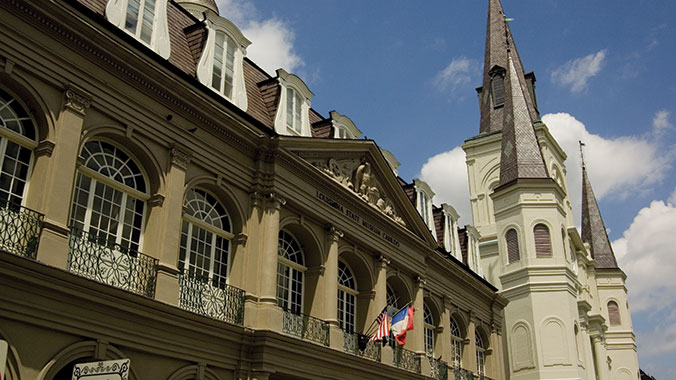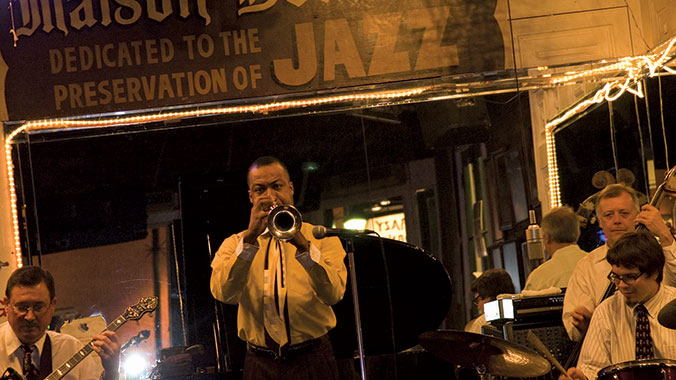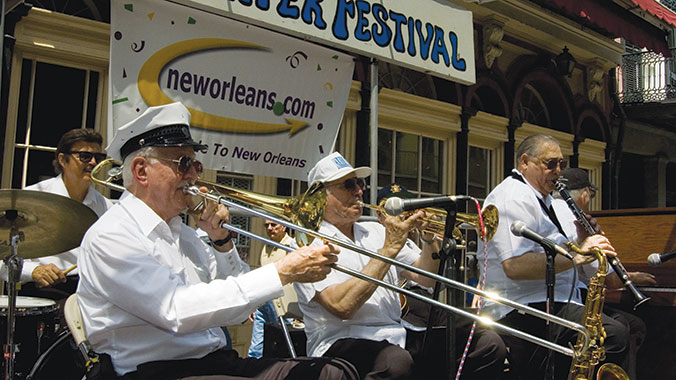A Streetcar Named Desire
by Tennessee Williams
This classic drama follows Blanche DuBois and the issues that arise when she moves to New Orleans to live with her sister and her husband.
Creole Trombone
by John Mc Cusker
"John Mc Cusker is a noted journalist,musician, and photographer from New Orleans.
Edward ""Kid"" Ory (1886-1973) was a trombonist, composer, recording artist, and early New Orleans jazz band leader. Creole Trombone tells his story from birth on a rural sugar cane plantation in a French-speaking, ethnically mixed family, to his emergence in New Orleans as the city's hottest band leader. The Ory band featured such future jazz stars as Louis Armstrong and King Oliver, and was widely considered New Orleans's top ""hot"" band. Ory's career took him from New Orleans to California, where he and his band created the first African American New Orleans jazz recordings ever made. In 1925 he moved to Chicago where he made records with Oliver, Armstrong, and Jelly Roll Morton and captured the spirit of the jazz age. His most famous composition from that period, ""Muskrat Ramble,"" is a jazz standard. Retired from music during the Depression, he returned in the 1940s and enjoyed a reignited career."
Jazz Masters of New Orleans
by Martin Williams
Presents a portrait of New Orleans and the history of jazz as revealed in the careers of such jazz musicians as Louis Armstrong and Sydney Bechet. Williams was director of the Jazz Program in the Smithsonian Institution, and "brings a refreshing wholeness of perspective to the music."
Jelly's Blues: The Life, Music, and Redemption of Jelly Roll Morton
by Williams M. Gaines
Jelly's Blues recounts the tumultuous life of Jelly Roll Morton (ca., 18851941). A virtuoso pianist with a larger-than-life personality, he composed such influential early jazz pieces as "King Porter Stomp" and "New Orleans Blues." However, by the late 1930s, he was nearly forgotten. In 1992, the death of an eccentric memorabilia collector led to the unearthing of a startling archive, revealing Morton to be a much more complex and passionate man than many realized. An especially immediate and visceral look into the jazz worlds of New Orleans and Chicago, Jelly's Blues is a definitive biography, a long overdue look at one of the twentieth century's most important composers.
Louis Armstrong: An American Genius
by James Lincoln Collier
Louis Armstrong. "Satchmo." To millions of fans, he was just a great entertainer. But to jazz aficionados, he was one of the most important musicians of our times--not only a key figure in the history of jazz but a formative influence on all of 20th-century popular music. Set against the backdrop of New Orleans, Chicago, and New York during the "jazz age", Collier re-creates the saga of an old-fashioned black man making it in a white world. He chronicles Armstrong's rise as a musician, his scrapes with the law, his relationships with four wives, and his frequent feuds with fellow musicians Earl Hines and Zutty Singleton. He also sheds new light on Armstrong's endless need for approval, his streak of jealousy, and perhaps most important, what some consider his betrayal of his gift as he opted for commercial success and stardom. A unique biography, knowledgeable, insightful, and packed with information, it ends with Armstrong's death in 1971 as one of the best-known figures in American entertainment.
New Orleans Jazz: A Family Album
by Al Rose and Edmond Souchon
If you are a lover and historian of Jazz, especially Dixieland, this is a must have. Many famous artists are listed, but also many obscure and unknown ones as well that helped form and develop the Jazz scene in New Orleans. Additionally, rare photos of numerous individuals, bands and locations in New Orleans are featured.
Nine Lives: Mystery, Magic, Death, and Life in New Orleans
by Dan Baum
Nine Lives is a biography voiced through the lives of nine characters spaning over forty years who tell their stories of living in this complex and facinating city. From outsider artists and Mardi Gras Kings to jazz-playing coroners and transsexual barkeeps, these characters are challenged to rise to acts of heroism or sink to the bottom as they face the devistation of two of Louisiana's most epic storms: Hurrican Betsy, which transformed the city in the 1960's, and Katrina, which nearly destroyed it. Dan Baum brings the kaleidoscopic portrait to life, showing us what was lost in the storm and what remains to be saved.
Why New Orleans Matters
by Tom Piazza
In the aftermath of Katrina and the disaster that followed, promises were made, forgotten, and renewed. Now what will become of New Orleans in the years ahead? What do this proud, battered city and its people mean to America and the world?
Award-winning author and longtime New Orleans resident Tom Piazza illuminates the storied culture and uncertain future of this great and neglected American metropolis by evoking the sensuous rapture of the city that gave us jazz music and Creole cooking; examining its deep undercurrents of corruption, racism, and injustice; and explaining how its people endure and transcend those conditions. And, perhaps most important, he asks us all to consider the spirit of this place and all the things it has shared with the world: its grace and beauty, resilience and soul.
















